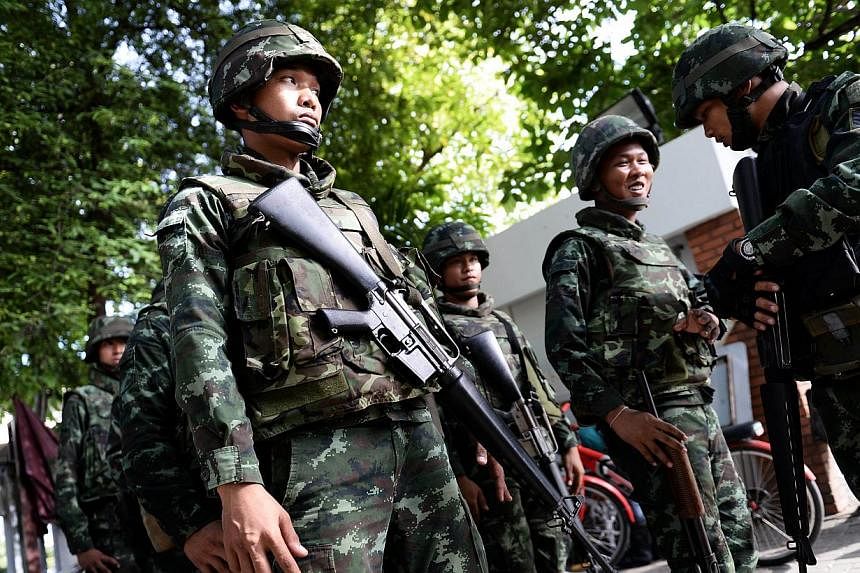BANGKOK (REUTERS) - Thailand's government is still running the country although the army brought in martial law early on Tuesday and will ensure security, the acting justice minister said.
"It's good that the army is looking after the country's security. However, the government still has full power to run the country," Chaikasem Nitisiri told Reuters.
Thailand's army declared martial law on Tuesday to restore order after six months of anti-government protests which have left the country without a proper functioning government, but the move did not constitute a coup, military officials said.
The caretaker government was still in office, said deputy army spokesman Colonel Winthai Suvari, following the surprise announcement on television at 3 am local time.
"This martial law is just to restore peace and stability, it has nothing to do with the government. The government is still functioning as normal," Mr Winthai told Reuters.
 Thailand has been stuck in political limbo since Prime Minister Yingluck Shinawatra and nine of her ministers were dismissed on May 7 after a court found them guilty of abuse of power.
Thailand has been stuck in political limbo since Prime Minister Yingluck Shinawatra and nine of her ministers were dismissed on May 7 after a court found them guilty of abuse of power.
An acting prime minister has since taken over. The crisis, the latest instalment of a near-decade-long power struggle between ousted former prime minister Thaksin Shinawatra, Yingluck's brother, and the royalist establishment, has brought the country to the brink of recession.
The military, which put down a protest movement in 2010, has staged numerous coups since Thailand became a constitutional monarchy in 1932, the last one in 2006 to oust the former telecommunications tycoon Thaksin.
A senior US official said last week the United States was "reasonably confident" the military in close ally and Thailand would exercise restraint and not intervene in the crisis.
Amy Searight, deputy assistant secretary of defense for South and Southeast Asia, said it was "reasonable to think there were lessons learned" after the Thai military ousted Thaksin, which saw Washington cut aid to the country.
Troops were patrolling in Bangkok and had secured television stations, one Thai army general said.
"We declared a state of emergency, it's not a coup. Because of the situation, it's not stable, they kill each other every day," the general, who declined to be identified, told Reuters.
He said soldiers were patrolling in Bangkok and had secured television stations.
"We need cooperation from them to announce to the people 'do not panic, this is not a coup'," the general said.
Acting Prime Minister Niwatthamrong Boonsongphaisan on Monday ruled out resigning as a way out of a protracted political crisis that is stunting economic growth, as anti-government protesters stepped up pressure to remove him and install a new administration. Six months of turmoil that has included violent protests and a disrupted general election is dragging down Southeast Asia's second biggest economy, which shrank 2.1 percent in the first quarter of the year.
Commerce Minister Niwatthamrong replaced Yingluck, but the anti-government protesters say he has no legal standing and they want a "neutral" government to push through reforms.
Weak exports and the political mayhem have damaged the economy, prompting the state planning agency to cut its forecast for 2014 growth to between 1.5 and 2.5 percent, from a range of 3.0 to 4.0 percent.
The government and its supporters view a general election as the best way to solve the crisis - the ruling Puea Thai Party would be well placed to win - but a vote tentatively scheduled for July 20 looks to be off the table.
Jatuporn Prompan, leader of pro-government "red shirt" activists said he and his followers would sustain a protest in Bangkok's western outskirts until the restoration of "democratic principles" leading to an election.
"That's fine," Jatuporn told Reuters when asked about his reaction to the declaration of martial law. "We will stay here and continue our protest until the country is back to democratic principles, which will lead to an election and getting a new elected prime minister."
A Feb 2 election was disrupted by opposition supporters and then declared void by the Constitutional Court. The protesters say they will disrupt any vote before changes to the electoral system are pushed through.

